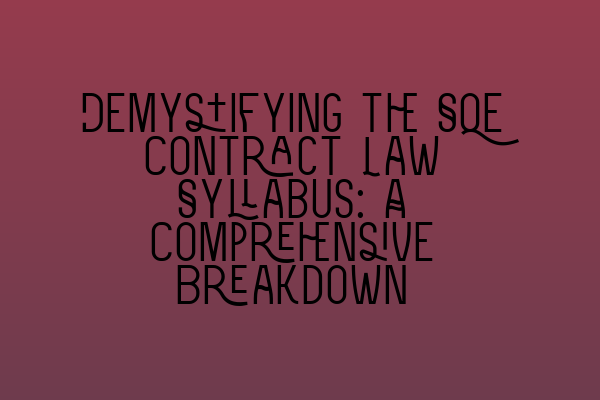Demystifying the SQE Contract Law Syllabus: A Comprehensive Breakdown
The Solicitors Qualifying Examination (SQE) is the new assessment framework introduced by the Solicitors Regulation Authority (SRA) for individuals who wish to qualify as solicitors in England and Wales. Aspiring solicitors now have to navigate this new examination format to demonstrate their competency in various areas of law.
One of the key components of the SQE is the Contract Law syllabus, which is designed to test candidates’ understanding of contractual principles and their application in real-life scenarios. In this blog post, we will provide a comprehensive breakdown of the SQE Contract Law syllabus, helping you demystify its content and prepare effectively for the examination.
1. Formation of Contracts
The formation of contracts is a fundamental aspect of Contract Law. Candidates should be familiar with the essential elements required for a valid contract, such as offer, acceptance, consideration, intention to create legal relations, and certainty of terms. It is crucial to understand how these elements interact and how to analyze contractual scenarios in light of these principles.
2. Terms of a Contract
Contract Law deals extensively with the terms of a contract, which define the rights and obligations of the parties involved. Candidates should have a solid understanding of express and implied terms, conditions, warranties, and innominate terms. They should also understand how terms are incorporated into a contract and the potential remedies for breach of contractual terms.
3. Discharge and Frustration of Contracts
Discharge and frustration of contracts are circumstances where a contract is brought to an end. Candidates should be familiar with the various methods of discharge, such as performance, agreement, breach, and frustration. They should also understand the consequences of discharge and how it affects the parties’ rights and obligations.
4. Remedies for Breach of Contract
When a contract is breached, the innocent party may seek remedies to protect their interests. Candidates should have a clear understanding of the available remedies, including damages, specific performance, injunctions, and restitution. They should also be able to analyze situations and identify which remedy is most appropriate in a given scenario.
5. Misrepresentation and Duress
Misrepresentation and duress are situations where contracts are entered into under certain pressures. Candidates should be familiar with the different types of misrepresentation, such as innocent, negligent, and fraudulent, and understand the potential remedies for misrepresentation. They should also be able to identify cases involving duress and its impact on the validity of a contract.
6. Illegality and Unenforceable Contracts
There are certain contracts that are considered illegal or unenforceable under the law. Candidates should understand the concept of illegality and be able to recognize contracts that are void, voidable, or unenforceable. They should also be aware of the legal and practical consequences of engaging in illegal or unenforceable contracts.
7. Privity of Contract and Third-Party Rights
Privity of contract refers to the relationship between the contracting parties and their ability to enforce contractual rights and obligations. Candidates should understand the concept of privity and the exceptions to the general rule. They should also be aware of the rights and liabilities of third parties in certain circumstances.
8. Consumer Rights and Protection
Consumer rights and protection laws play a significant role in contract law. Candidates should be familiar with the key provisions of consumer protection legislation, such as the Consumer Rights Act 2015. They should also understand the rights afforded to consumers and the remedies available in case of breaches of consumer protection laws.
In conclusion, the SQE Contract Law syllabus covers a wide range of topics that aspiring solicitors must master to demonstrate their competence in contract law. Understanding the formation of contracts, terms, discharge, remedies for breach, misrepresentation, duress, illegality, privity of contract, and consumer rights is crucial for success in the SQE examination.
If you’re interested in mentorship for aspiring solicitors, nurturing talent in the legal field, you may find our related article Mentorship for Aspiring Solicitors: Nurturing Talent in the Legal Field helpful.
For guidance on navigating the complexities of the legal system, you can read our related article Legal Challenges and Pitfalls: Navigating the Complexities of the Legal System.
If you want to gain a deeper understanding of the SQE and what you need to know about it, our related article Demystifying the Solicitors Qualifying Examination (SQE): What You Need to Know provides valuable insights.
For those seeking mentorship on their legal journey, our related article on Mentorship for Aspiring Solicitors: Finding Guidance on Your Legal Journey offers practical tips and advice.
If you’re interested in exploring alternative dispute resolution as an effective approach to legal conflicts, you may find our related article Exploring Alternative Dispute Resolution: An Effective Approach to Legal Conflicts informative and enlightening.
